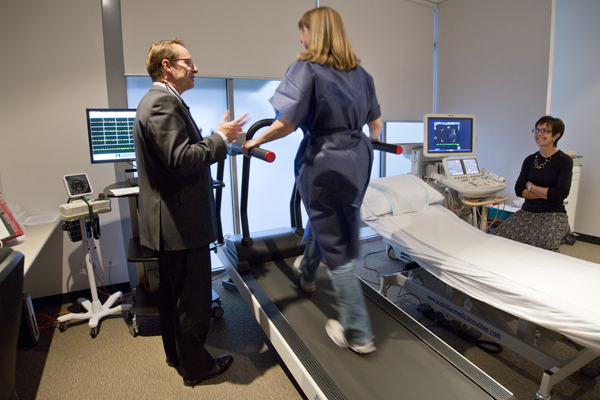Exercise Stress Echocardiography (Stress Echo) is an ultrasound of the heart performed before and after exercise (walking on a treadmill) that allows your doctor to assess how your heart responds to exercise.

Test Description
What is it?
Exercise Stress Echocardiography (Stress Echo) is a non-invasive testing method of detecting heart disease which may otherwise not be evident without exercise. A resting ECG and Echocardiogram where ultrasound images of your heart are taken, is done prior to exercise and at maximum exercise. The patient will be asked to complete a regular treadmill exercise test, while their ECG, heart rate & blood pressure are recorded.
After the treadmill exercise test the patient will be quickly moved back to the patient bed and the heart will be looked at again for any sign of abnormal activities. After the test, the patient may return to their normal routine. Patients should ask the doctor about taking any medicine that they were told to skip before the test.
Why do I need this test?
This test is most commonly used to investigate chest pain or angina symptoms, to help diagnose any underlying coronary artery disease (blocked arteries), or to exclude ischemia heart disease. Stress Echo is also often used to investigate the cause of shortness of breath with physical activity. The procedure may be used to look for abnormalities of the heart muscle or valves.
What to expect?
Electrode dots are placed on your skin. Chest hair may need to be shaved off a small area. You will be asked to lie down on the examination bench. The hand-held transducer will be applied to the chest wall with ultrasound gel. The images of your heart will be displayed on the monitor, and the sound of the blood flow may be heard.
You will then need to walk on the treadmill to increase the stress on your heart. The treadmill will increase in speed and slope every few minutes, to achieve your maximal workload. At that point, the treadmill will be stopped, and it is important to lie back down on the examination bench as quickly as possible. This is to visualise the heart under maximal workload. Any abnormalities of the blood pressure, ECG tracings and echo images will be recorded. You should also report any symptoms you experience to the supervising staff. You may ask to stop the test at any time.
We bulk bill all valid referrals
Short wait times when you book an appointment with rapid results.
What are the risks?
For the echocardiogram component this is very safe. No x-rays are used, and the echo is similar to an ultrasound performed during pregnancy.
For the exercise component you may encounter some side effects such as;
- Shortness of breath
- Minor chest discomfort
- Dizziness
- Palpitations; and
- Muscle fatigue.
If these symptoms are a concern the test will be stopped.
Serious complications such as heart attack, life-threatening heart rhythm disturbances are rare (less than 1%). Death as a result of the test is extremely rare.
You will be monitored closely by the medical team during your test. You may need to wait for some time after the test before driving if you feel unwell or require monitoring.
Preparation Details
(Approximately 45-60 minutes duration)
You will be required to wear clothing and footwear suitable for exercise. The procedure will require you to remove the clothing from your upper body. A gown will be provided to you to change into.
Do not drink beverages containing caffeine 3 hours before your test (including Tea/Coffee/Cola/Energy drinks)
You should avoid a heavy meal for at least 3 hours before your test.
Do not smoke 3 hours prior to the test.
If your medications include Beta Blockers and selected Calcium channel blockers these are to be stopped 24 hours prior to your test unless otherwise advised by the doctor. Please discuss this with your Doctor, or call the Clinic if you are unsure.
Please bring an up to date list of your medications to the appointment (or a bag with all your medications in it).
What Happens After The Test?
The results of the Exercise Stress Echocardiography will be made available to your referring Medical Practitioner. Urgent results will be communicated directly by telephone.
Why wait or pay too much for diagnostic tests?